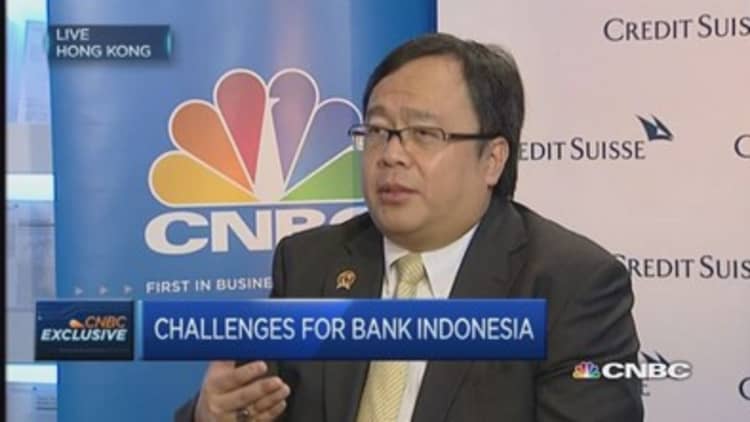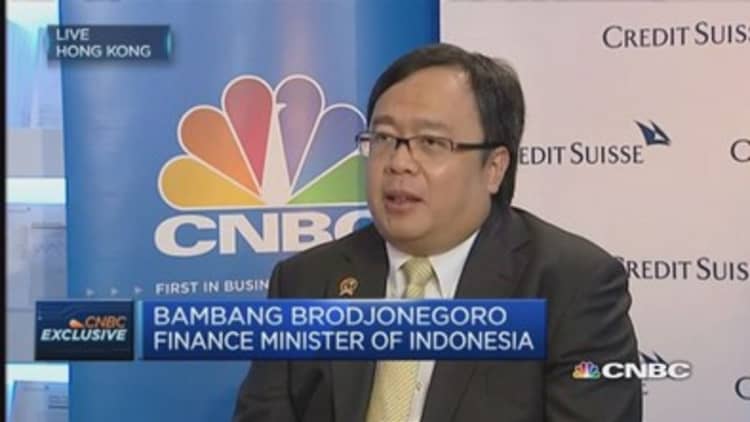After Indonesia was crushed in the Asian financial crisis - its economy shrank 13 percent in 1998 - the battered rupiah helped it start to export its way back to growth.
Now, Southeast Asia's biggest economy is growing at its slowest pace in five years, 5 percent, and the currency recently tumbled to its weakest since 1998.
The rupiah's 9.3 percent slide against the dollar since June should help Indonesian manufacturers who export clothes, shoes and other products cut prices and win orders.
But it isn't working that way, due to Indonesia's rising wage costs and other factors. Problems with infrastructure and bureaucracy have added to pessimism that factories can lift exports and give Indonesia a boost it needs as the coal and commodity boom which fueled growth for years is history.

"We are really suffering," said Hariyadi Sukamdani, head of the national employers association. "Wages and costs increase every year."
Textiles, a pivotal export, show Indonesia's struggle to compete. Exports have increased over the years but Vietnam, which only had a small garment industry in 2000, now ships out far more clothing.
Only just among the world's top 30 garment exporters in 2000, Vietnam is now the seventh largest, with shipments of $17.9 billion in 2013, according to United Nations figures.
Read MoreWhy Indonesia strugglesto attract investors
Meanwhile, Indonesia has dropped to 14th place from 11th, and its share of the $490-billion global trade has fallen from 2.4 percent to 1.6 percent, or $7.7 billion.
Surging wages
Nur Cahyadi, chairman of the wood and rattan furniture association in East Java, estimated that members have lost $40 million this year because European and U.S. buyers switched furniture orders to Vietnam.
While the weak rupiah should be aiding exporters, it's not enough to compensate for their overall loss of competitiveness.
Many factory owners say their biggest problem is a surge in wages, kept low for decades when Suharto ran Indonesia, as now-empowered unions and local officials have raised them. And an inflation spike in late 2014 spurred demands for further increases.
Because Indonesia's inflation is higher than that in countries it competes with, the rupiah's real trade-weighted exchange rate is 9.8 percent stronger than in mid-2014, according to JP Morgan.

That's the "real killer" for exporters, says Sudhir Shetty, the World Bank's chief economist for East Asia.
Ali Mas'ud, head of footwear association in East Java, said the main reason producers there "are not competitive" is that, in three years, the monthly minimum wage has doubled to 2.7 million rupiah ($209).
'We have no law'
Ade Sudrajat, chairman of the Indonesia Textile Association, said there would be no problem with wage hikes if they were kept in line with the official mechanism for setting them. But local governments sometimes change things based on protests.
Read MoreIndonesia betson 30% increase in tax collections
"This is like we have no law, like anarchy," Sudrajat said.
Owing to its vast domestic market, Indonesia is getting more inward investment. Though it's losing ground globally in exports of things like furniture, garments and electrical goods, its share of world car exports is growing, albeit from almost nothing. Yet it still punches below its weight in manufacturing.
Morgan Stanley reckons the commodity boom crowded out other sectors, noting that Indonesia's share of global manufacturing exports slipped from a high of 0.8 percent in 2000 to a low of 0.5 percent in 2008, partly because of the strong real exchange rate.
Without wider reforms to check rising costs, the rupiah's drop against the dollar isn't going to lift exports, said the World Bank's Shetty.
"You can get a little bit out of exchange rate movements but, fundamentally, it has to be about being competitive."

